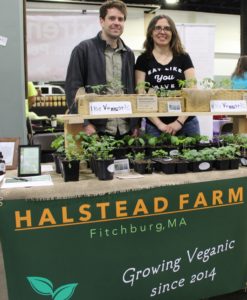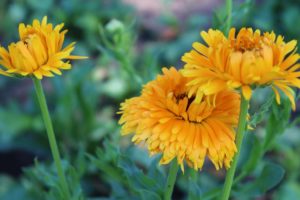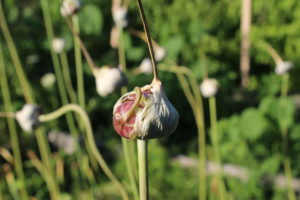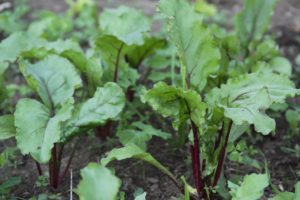Halstead Farm is a veganic farm outside of Fitchburg, MA, farmed by Eleonora and Evan Halstead. This profile is based on conversations and exchanges between Mona Seymour, Eleonora, and Evan.
Give us an introduction to Halstead Farm

Evan and Eleonora at New England VegFest 2017
We moved to the 40-acre property in the summer of 2014. The last owners were really into planting unique ornamental species of trees and perennials, so we inherited a beautiful magical place, but not a lot of edibles. (Though we are discovering how to make tinctures and herbal medicines from some of the leaves, flowers, and bark.) Last year was our second growing season on the farm, and we expanded to growing a variety of vegetables, herbs, fruits, and flowers on a former hay field. On our hill we started an apple orchard, and in our permaculture gardens we have blueberries, raspberries, and peach and pear trees alongside a diverse group of trees, shrubs, and perennials. We currently have five acres in agricultural use. Our plan is to keep expanding each year and not go broke!
We are adapting several farming models based on intuitive approaches to fit our needs, incorporating UK Stockfree, permaculture, and organic growing methods. We minimize the use of plastic on our farm (so no plastic mulch), we grow green manure (like winter rye, hairy vetch, and oats), and practice no-till methods, reducing our reliance on fossil fuels. No machinery is used other than a mower at this time.
How and why did you get into farming, and into veganic farming?
We’re new to “officially” being farmers, but we feel like we have been involved for quite a while as we have been going to organic farming conferences for over a decade. In 2002, we became members of Northeast Organic Farmers Association (NOFA), and as backyard gardeners we attended numerous workshops on growing peaches, composting, permaculture, and organic gardening practices. We’ve been huge advocates of organic farming, participated in the Non-GMO food movement and other activism, and daydreamed about starting a farm and changing the world.
During our active political years, in our early 20’s, we felt like we had a clear and simple solution in our hands if only others could join forces to help stop ecological, social, and racial injustice, and just “save the planet” so to speak. It was so simple. We are from the generation of “Mean Corporations Suck”. But we realized how strangely slow change was. Over the years, one consistent positive message we have subscribed to is “be the change you want to see”. We try to live and demonstrate our beliefs and values every day, even if in seemingly meager ways. For many years, we found that the most lasting and impactful change happens as a result of individuals persistently making change. Small stuff, like inquiring with businesses about vegan organic options, influences the individuals we interact with to recognize and value a real need.
Even though advocacy is one effective route, we still felt like we needed to do something more. Something permanent or lasting. Now the farm is our activism. We started the farm to anchor our existence as well as to test and demonstrate our commitment to our values. And we promote the idea of veganic farming with our presence at vegetarian festivals in our region. We table with our products and provide educational material with how-to’s and resources on veganics. Veganic is not new, but it is new to a lot of people around here. I think we may be the only veganic commercial farm in Massachusetts.
We’ve been strict vegans for over 17 years, and into organic even longer. Since we’re vegan, we’ve always leaned toward veganic farming without knowing it was “a thing”. It didn’t seem right to add animal dung – it just felt wrong, it was bad energy – and this forced us to find another option. We also don’t like the idea of relying on animals. It doesn’t seem sustainable to rely on another industry for fertility. And, we’re hardcore organic people. We don’t want to risk importing animal manure that is not organic. I think we originally heard about veganic farming in 2002 when we learned about Helen and Scott Nearing, two of the Back to the Land movement founders. In 2012, we visited their homestead in Maine and saw how abundant and plentiful it still was, and this planted the seed in our heads. [The Good Life Center, which works to preserve the Nearings’ homestead and broader legacy, has followed their example in using no animal products in the garden.] Veganic has grown in our minds over the past few years as something that can be done and we wanted to prove it.
Before we moved to this property, we owned a small eighth of an acre, where we experimented with veganic methods such as using seaweed as fertilizer. And before that, we rented two acres with a friend who gardened organically, but our experiences were limited.
How do you market your products? Do you have sales and marketing strategies specific to veganics?

Veganic walnut ink
We sell our flowers wholesale to florists and we participate in occasional outdoor festivals and one weekly farmers market. Last year we sold herbs and vegetables at the Boston Vegetarian Festival, and this year we sold vegetable, herb and flower seedlings at the New England VegFest. We also promote a unique handmade product: we make our own black walnut ink for writing and drawing.
One of our goals at veg festivals is to keep building our community contact lists so that we can easily connect with people when we have other events or new products out. We are working on building a relationship with a couple of vegan restaurants who have expressed interest in our products. One of these is a vegan restaurant near Boston that came across us at the Boston Vegetarian Festival. The owners hadn’t heard of veganics, and they got really excited when they learned about veganics and our farm.
We think veganic is an effective marketing mechanism. It sets us apart. We’re targeting our audience when we go to veg festivals – we want vegetarians and vegans to come across our products, so we think it’s a positive thing to have the word “veganic” on our booth and products. And vegans are a captive audience; they just need to be educated about organics and veganics. Our pamphlets help people understand that we are not just another local farm. Also, organic is just as important as veganic to us. We find that the vegan community is not fully on board with why organic is important. The way we see it, contaminating soil, water, and ecosystems is not good for animals, people, or the planet. So we hope our products educate people on this and help to bring farming practices to a new level.
What challenges have you faced as a veganic farmer?
Veganic farming requires more planning and in some ways more work, but we feel it’s worth it in the long run. We have to strategically plan where to use our limited compost and green manure and how to rotate crops to maximize our space; take into consideration companion planting; and grow all of our own seedlings since you can’t buy veganic seedlings anywhere else.
In terms of inputs, we’re learning about soil amendments and cover crops as we go, and we’re working with the fact that there is a limit on where we can get compost materials that don’t include animal byproducts. There are strategies that NOFA farmers have taught us, such as getting your compost materials from local farms and businesses and restaurants – but you can’t get this stuff from just anywhere for a veganic farm. We targeted a health food restaurant and it took a while to get them to work with us, but now we have 100% organic vegan compost. The store serves meat and dairy, so we’ve had to convince them to separate these products from the compost we pick up from them. So, getting alternatives to manure has been a bit of a challenge and we definitely expect it to continue to be a challenge as we grow and use more of our acreage. It’s also labor intensive to make mulches and soils and such. We currently do everything by hand so our green footprint is all set, but it is tiring.
One of the biggest challenges as a veganic farmer is creating a demand for a fairly “new” concept. It’s hard to find a supportive community to help grow the business end of the farm but we are working on building a consumer base by meeting lots of people at outdoor events and festivals.
Is there skepticism in the organic farming community toward veganic farming? What would need to happen in that community to make them more open to veganics?
After attending the 2015 NOFA conference where there was an outward anti-vegan stance on the planet and health, we recognized that the organic farmers aren’t ready for veganic farming. Maybe it threatens them? There was a sense of desperation in the air with talk about “regenerative” agriculture – pushing the need for more small animal farms as an answer to ecological problems in the world. We felt it was a desperate, backwards, and uninformed perspective that was very pro-animal industry. The keynote speaker that year focused on the need for animal products for a healthy gut. It was like… “What year is this?” That following year we decided not to renew our membership. But in 2016, we were asked if we wanted to host a meetup at the NOFA conference. We hesitated at first, but decided to give it a chance and tried to host a veganic farming meetup at the conference. When we got to the event we checked in with the event coordinator and we were welcomed with a question: “Veganic? Does that mean you don’t eat anything?” Then we noticed the conference handbook listed our event as a vegan recipe-sharing event, rather than a veganic farming event. It could have been an oversight, but on some level they just can’t fathom that veganic farming exists!
NOFA used to be our farming community until we realized how openly anti-vegan it has become. We even asked a bookseller at the event if they had any books on veganic farming, and we were told that these farmers were not vegan friendly so they don’t carry such books at these events. It just didn’t feel like a vegan-friendly community anymore.

Calendula growing at Halstead Farm
Around the same time we discovered the national veganic community is a growing and supportive place for us; the only problem is we don’t know of any other veganic commercial farms in Massachusetts. Now our goal is to help build that community by promoting veganic education at events, and reaching out to other veganic farms in the Northeast and throughout the country.
On the bright side, in April 2017 we were approached by a NOFA representative at the New England VegFest and were informally told that they would work with us to include veganic farming as a new directory listing category.
What are your plans for your 40 acres over the coming years?
Having all this land has been inspiring and life changing. Our plan is to continue to maximize the five acres we currently have in agricultural use. We have plans to expand the orchard and start a vineyard in the coming years. Our goal is to preserve the rest of the property as wild spaces for animals such as turkey, deer, moose and bear. One of the advantages of all of the woods on the property is that the deer haven’t bothered the gardens, since there is plenty of natural deer food in the woods for them. We say that now, but hopefully it stays that way.
Our approach is to take small achievable steps and not accumulate debt. We’d also eventually like to hire someone to run the farm full-time since we both have other work in other fields (art and architecture) in addition to farming.
Our inspirational motto has been to double our farm income each year. Though this sounds overly optimistic, it’s really quite achievable if you start with $1000 the first year! We hope to grow the farm each year, and as the saying goes… it won’t be any easier, it will only get better. So far this is working for us!
Is there anything you’d like to add about your farm?
People always ask if they can visit the farm, but we are not interested in farm tourism at this time, as this is not a public farm. We don’t have facilities for visitors. This is our private home and we like the peace and quiet. As the neighborhood changes and development encroaches we may decide to turn it into a vegan amusement park someday, but for now it’s just our home and farm.
We do like to invite our family and friends to our volunteer days at which we host a vegan lunch. Last year we started up a pumpkin patch with the help of about ten friends, and this year we planted a row of apple trees.
We recognize that the vegan community has demonstrated a need for more community building events and we will explore how the veganic farm can support that in the future.
Photo Credits: Photo 1 by Brianna Boroway Klingensmith; photos 2, 3, 4, 5 and 6 by Eleonora Halstead.



